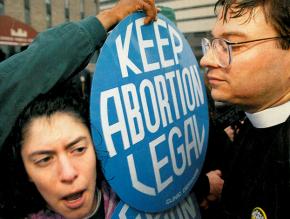Operation Failure in Buffalo
Beginning in the summer of 1991, anti-abortion forces organized under the name "Operation Rescue" (OR) set out to perform acts of civil disobedience to blockade women's health clinics around country. In August, hundreds of anti-choice protesters descended on Wichita, Kan., successfully shutting down clinics there.
From that experience, it became clear to many abortion rights activists that court injunctions weren't going to be enough to keep the Religious Right from closing our clinics--and that the only way to push back OR was to confront them. As the group's leader Randall Terry said at the time, "People can't grasp that they're dealing with a dedicated group of activists who are prepared to die, if need be, to put an end to the child-killing, so the threat of a few thousand dollars in fines is irrelevant."
When OR set Buffalo, N.Y. as its next target in April 1992, Terry and his followers thought they'd get a repeat of Wichita. But this time, abortion rights supporters from around the country were ready for them. Here, on the anniversary weekend of Roe v. Wade, the U.S. Supreme Court decision that legalized abortion, we reprint a report by that appeared in Socialist Worker in May 1992.
BUFFALO, N.Y.--"Operation Rescue, wherever you go, you'll remember Buffalo!" was what hundreds of pro-choice clinic defenders chanted at a demoralized Operation "Rescue" (OR), as pro-choicers chased OR out of town.
OR had promised four weeks of blockades of Buffalo clinics on the scale of their August 1991 attack on Wichita, Kan. Unlike Wichita, in Buffalo, OR was met from day one by angry pro-choice crowds chanting, "You're not in Kansas anymore, we'll defend the clinic door!" From the time OR started its attacks on clinics on April 20, it was clear that the clinic defenders controlled access to the clinics, and that Buffalo would be a victory for abortion rights.
Wichita focused national attention on OR's anti-woman message and gave anti-abortion bigots a boost of confidence. It was a clear defeat for abortion rights activists, and since then, pro-choice activists have rallied around the cry "No More Wichitas!"
As soon as OR announced its Buffalo plans, abortion rights groups from all over the country began to make plans to defend the clinics. This organizing went against the "accepted wisdom" of the mainstream pro-choice movement, which sought instead to intensify the losing tactics used in Wichita: legislation, court injunctions against OR and relying on the police to keep the clinics open.

Groups like the National Organization of Women (NOW), despite the influence they have over thousands in the pro-choice movement, did not mobilize nationally for Buffalo, and even discouraged clinic defense. The Cincinnati NOW chapter, for example, wanted to send busloads of people to Buffalo, but canceled plans because of national NOW policy.
Despite these obstacles, there were thousands of activists who were sick of remaining passive and defensive in the face of attacks on abortion rights in the streets and in the legislatures.
By April 20, OR leaders were publicly revising and scaling back their expectations. OR no longer felt confident about its ability to close abortion clinics.
On April 20 and 21, everyone expected the "big hit." But outnumbered by the pro-choice presence, OR could only muster small numbers of supporters for prayers across the street from the clinics. The daily, mass clinic defenses clearly showed who had the edge in this battle, and it showed how easily OR can be defeated when challenged.
On April 22, OR worked out a media stunt with the cops. One hundred and ninety OR activists knelt in the street, just in front of the clinic defense lines, and were carted off by cops without challenging access to the clinic. The media was hungry for OR's big day, and pounced on the event. They reported it as if it were a blockade and took OR leaders' word that "many women had been scared away" by the event.
But the clinic defenders were well aware of the situation and were made more confident. By week's end, Patricia Ireland, the new president of NOW, made an appearance in Buffalo. In light of OR's defeat in Buffalo, Ireland was forced to express support for those defending the clinics. "We support clinic defense," she told a CNN reporter. "We have seen that this is a strategy that works."
Ireland's comments indicate that the abortion rights victory in Buffalo can renew the confidence of pro-choice activists nationwide. But NOW--and other mainstream groups--have yet to show a resolve in building militant action to shift their attention away from electoral politics.
The Buffalo victory shows that the energy and anger of thousands can win battles. Those in Buffalo were not politicians: they were students, working women and men, and others directly threatened by OR's activity. Our victory proved that people who are most affected by restrictions on abortion are the ones capable of offering real political leadership.
This article originally appeared in Socialist Worker in May 1992.


